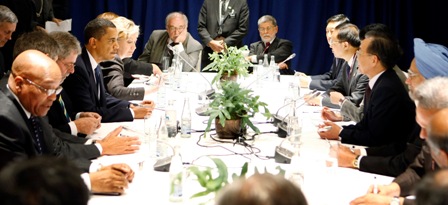Copenhagen Lessons Still Lost on China and the United States
More on:

Last week I traveled down to Mexico City as part of a delegation led by my colleagues Michael Levi and Shannon O’Neil to discuss climate change issues with Mexican officials and civil society leaders. Aside from discovering that Mexico City is beautiful, I found that the Mexicans are “all systems go” as they prepare for the next round of climate negotiations to be held in Cancun in December. They are determined to ensure that the Cancun round avoids not only the logistical nightmares but also the political pitfalls of the Copenhagen meeting. For that to happen, they need a modicum of cooperation and constructive participation by both the United States and China. Unfortunately, it doesn’t seem that either country is getting the point.
As the Mexicans reach out to the United States and China, they confront oddly similar challenges. There is confusion over who, exactly, is directing climate policy in both countries. In China, is it the Foreign Ministry, the National Development and Reform Commission, or Zhongnanhai? In the United States, is it the State Department, the White House, or the Congress? It is hard for Mexico to negotiate when there are multiple institutions claiming negotiating rights.
The actual state of climate policy play within China and the United States only adds to the challenge for Mexico. In the United States, we’re not sure we even have a policy. Bills are passed in one house and collapse in the next. The silence out of the White House on the climate issue is deafening. I can only hope that energy and climate policy simply (and unfortunately) ended up being third on President Obama’s priority list after health care and financial reform, and that he will get to it soon. Or perhaps he is trying to accomplish climate policy through EPA regulations. It is hard to know.
In China, it is less about having a policy and more about meeting the objectives of the policy. The Chinese had a big “Oops!” moment a few weeks ago, when they realized that their energy intensity had increased by 3.2 percent during the first quarter of this year. That puts them far off track toward realizing their 20 percent reduction in energy intensity during 2006-2010. Indeed, I think they will struggle to achieve even 15 to 16 percent. Premier Wen Jiabao called out for an intensification of effort to meet the goal in the remaining months of the year; he knows that more is at stake than simply the 20 percent mark. If China can’t meet its first target, why should the world believe that it will meet its Copenhagen promise of reducing carbon intensity by 40 to 45 percent over 2005 levels? Unfortunately, nothing Wen said suggested a new way of doing business.
Mexico is stuck between these two climate giants, who are both disappointingly AWOL in helping Mexico make Cancun a success. The message that I took away and left with our Mexican hosts: look elsewhere for help in leading the next round of negotiations. Europe, small island states, and Japan all have strong vested interests in moving the ball forward. Mexico can’t afford to wait around and risk Cancun claiming the climate calamity crown from Copenhagen.
More on:
 Online Store
Online Store
